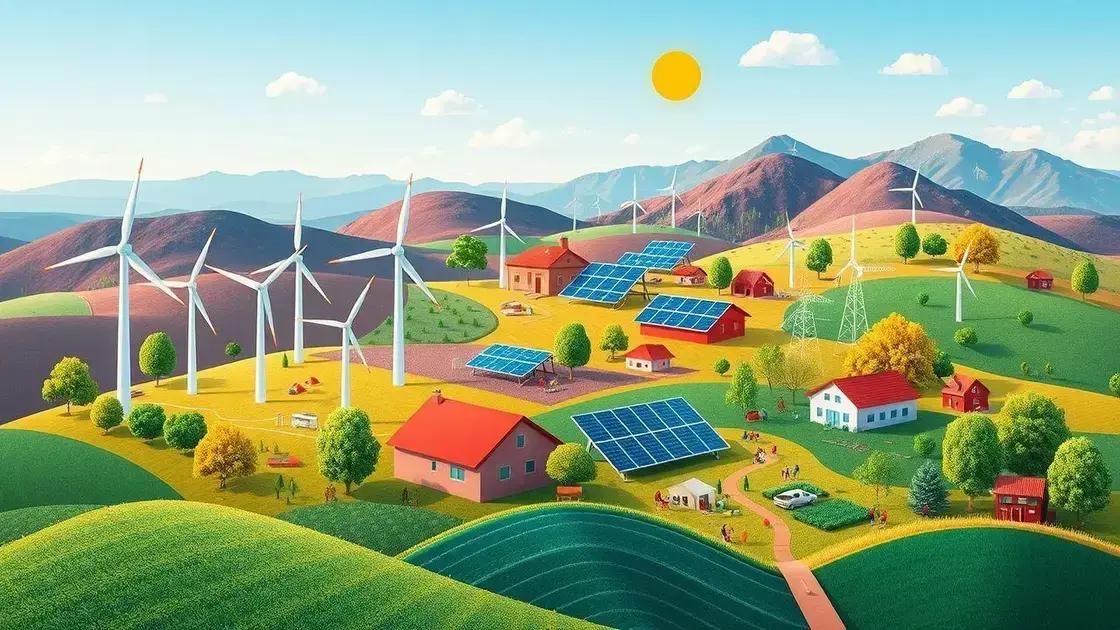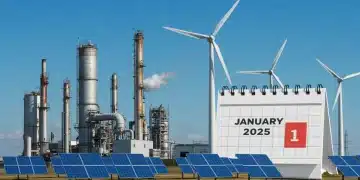Insights on renewable energy expansion: a closer look

Insights on renewable energy expansion highlight significant benefits such as job creation, lower costs, and environmental protection, while addressing challenges like high initial investments and infrastructure limitations.
Insights on renewable energy expansion are becoming increasingly important as the world shifts towards sustainability. Have you noticed how this change affects everything from your home energy bills to global climate policies? Let’s dive deeper into this fascinating topic.
Current trends in renewable energy
Current trends in renewable energy are shaping the future of our planet. With the rise of technology and increased awareness about climate change, more people are looking for sustainable options. From solar panels to wind turbines, these innovations are transforming how we create energy.
Increased Adoption of Solar Energy
Solar energy is becoming a go-to solution for many households. With falling prices and improved efficiency, it’s easier than ever to switch to this clean energy source. Communities are increasingly investing in solar farms that benefit everyone.
Growth of Wind Power
Another key trend is the growth of wind power. Wind turbines are popping up in many areas, harnessing nature’s energy. Not only does this reduce bills, but it also decreases reliance on fossil fuels. Many industries now rely on this sustainable source, creating jobs in the process.
- Job creation opportunities.
- Lower environmental impact.
- Investment in local economies.
As we move toward a cleaner future, the benefits become clearer. Less pollution and healthier air quality are just the start. Cities around the world are implementing programs to support renewable energy initiatives.
Government policies are also adapting to these trends. Incentives for using renewable energy are growing, pushing more people to consider these options. Tax breaks and subsidies make it more affordable for families to transition.
Emerging Technologies
Emerging technologies are making renewable energy even more efficient. Battery storage systems allow us to store energy for later use. This means that energy generated on sunny or windy days can be used at night or during calm periods. The focus on innovation, such as smart grids and AI in energy management, is also essential.
With these advancements, we can expect a rapid shift in global energy consumption patterns. Every step toward renewable sources is a step toward preserving our planet. The exciting part is that ordinary people can play a role in this green energy revolution.
Benefits of renewable energy expansion

The benefits of renewable energy expansion are numerous and impactful. As more people shift towards clean energy, we can see a positive change in various aspects of our lives. Not only does this help the environment, but it also brings economic advantages.
Environmental Benefits
One of the primary advantages is the reduction of greenhouse gases. By switching to renewable sources, we can significantly cut down on pollution. This leads to cleaner air and water, protecting ecosystems and wildlife.
Economic Growth
Renewable energy also creates job opportunities. With the rise of solar and wind energy, many new jobs are being established. This includes installation, maintenance, and innovation roles. Investing in renewable energy is investing in our future workforce.
- Increased job opportunities in various sectors.
- Lower energy costs over time for consumers.
- Stimulating local economies through infrastructure projects.
Additionally, renewable energy sources can lower energy costs in the long run. Once the initial investment is made, maintenance costs are typically lower compared to fossil fuels. This means savings for families and businesses, allowing more resources to be spent elsewhere.
The move towards renewable energy also enhances energy security. By utilizing local resources, countries can reduce their dependence on imported fuels. This creates a more resilient energy system and protects against price fluctuations.
Social Benefits
Furthermore, expanding renewable energy can lead to improved public health. Reduced air pollution results in fewer respiratory diseases and health care expenses. This promotes a healthier population and reduces the burden on health services.
In conclusion, the benefits of renewable energy expansion are clear and compelling. As we embrace these changes, we not only protect our planet but also foster a thriving economy and healthier communities.
Challenges in implementing renewable energy solutions
Implementing renewable energy solutions comes with its own set of challenges. While the benefits are clear, the road to adoption can be complex. Understanding these challenges is crucial for both policymakers and consumers.
Infrastructure Limitations
One significant hurdle is the existing infrastructure. Many regions still rely heavily on traditional energy sources. This outdated infrastructure can make it difficult for renewable energy to integrate effectively. Upgrading power grids to accommodate new technologies is essential.
High Initial Costs
Another challenge is the initial investment. Although renewable energy can save money in the long run, the upfront costs for technologies like solar panels and wind turbines can be high. This financial barrier can deter individuals and businesses from making the switch.
- Increased upfront costs for installation.
- Need for efficient financing options.
- Long payback periods can discourage investments.
Moreover, there can be regulatory obstacles. In some places, outdated laws may hinder the growth of renewable energy projects. Navigating complex regulations can discourage innovators and limit potential advancements.
Public perception also plays a role in this transition. Some people may be skeptical about the reliability of renewable energy sources. Building awareness and education around these technologies is essential for broad acceptance.
Geographic and Weather Dependencies
Additionally, the efficiency of renewable energy varies based on geographic location and weather conditions. Solar energy depends on sunlight, while wind energy requires consistent wind patterns. This variability can impact the overall effectiveness and reliability of energy supply.
Overall, addressing the challenges in renewable energy solutions requires collaboration between governments, businesses, and individuals. By working together to overcome these hurdles, we can pave the way for a more sustainable future.
Future outlook for renewable energy initiatives

The future outlook for renewable energy initiatives is promising and full of potential. As technology evolves, we can expect to see significant advancements that will transform the energy landscape. Governments and organizations worldwide are increasingly committing to green energy solutions.
Innovative Technologies
One significant factor in shaping this future is innovation. New technologies, such as more efficient solar panels and advanced wind turbines, are emerging. These innovations will make renewable energy more accessible and affordable for everyone.
Policy and Investment Growth
Increased investment in clean energy projects by both public and private sectors is crucial. Governments are enacting supportive legislation that encourages the adoption of renewable energy. Tax incentives and grants are becoming common, making it easier for businesses and households to make the switch.
- Focus on developing renewable energy infrastructure.
- Long-term financial incentives for green energy adaptation.
- Support for research and development in energy technology.
Public awareness and acceptance of renewable energy are also on the rise. More people understand the benefits of clean energy and are advocating for sustainable practices. This social movement is driving demand for greener options.
As renewable energy sources become more reliable and widespread, we can anticipate a shift in how energy is discussed and utilized. Smart grids and energy storage solutions will enhance efficiency, allowing communities to manage their power needs better.
Global Collaborations
International collaboration will play a vital role in advancing renewable energy initiatives. Countries will work together to share knowledge, technology, and resources. This shift towards global partnerships is essential for tackling climate change collectively.
The vision of a cleaner, sustainable future powered by renewable energy is becoming a reality. As these developments unfold, the energy sector will undergo a transformation that prioritizes environmental health, economic stability, and social equity.
FAQ – Frequently Asked Questions about Renewable Energy Expansion
What are the main benefits of renewable energy?
Renewable energy offers lower costs, job creation, and reduced environmental impact, making it a smart choice for a sustainable future.
What barriers exist to adopting renewable energy solutions?
Some barriers include high initial costs, outdated infrastructure, regulatory challenges, and public skepticism about reliability.
How can technological advancements help renewable energy?
New technologies improve efficiency and accessibility, making renewable energy sources more viable and cost-effective for consumers.
Why is global collaboration important for renewable energy?
Collaboration allows countries to share resources, knowledge, and technology, which can accelerate the transition to sustainable energy systems.





